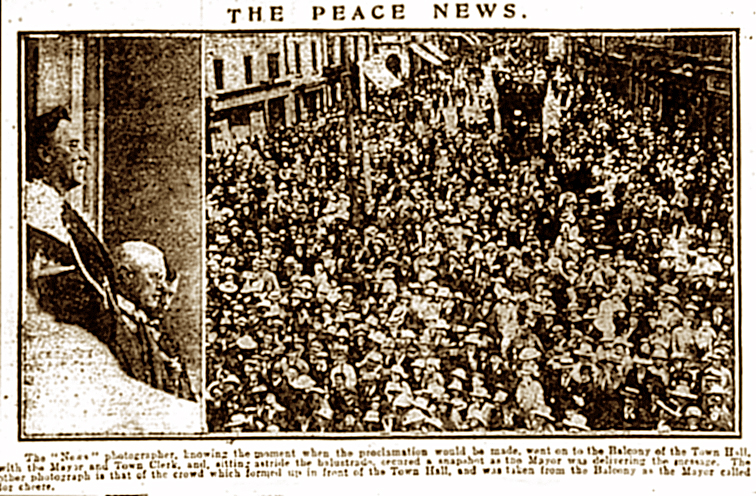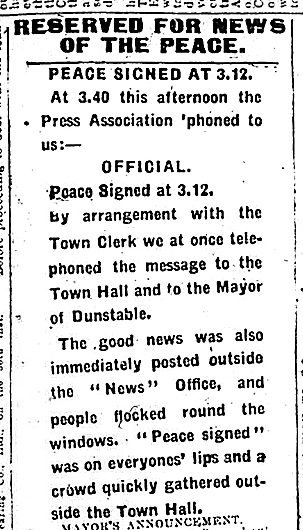
Luton had the news of the signing of the Versailles Peace Treaty on Saturday, June 28th, 1919, sooner than most provincial towns.
 A stop press item in that day's Beds & Herts Saturday Telegraph read: Peace signed at 3.12. At 3.40 this afternoon the Press Association phoned to us the following: "Official. Peace signed at 3.12. By arrangement with the Town Clerk we at once telephoned the message to the Town Hall and to the Mayor of Dunstable. The good news was also immediately posted outside the News office, and people flocked round the windows. 'Peace signed' was on everyone's lips and a crowd quickly gathered outside the Town Hall."
A stop press item in that day's Beds & Herts Saturday Telegraph read: Peace signed at 3.12. At 3.40 this afternoon the Press Association phoned to us the following: "Official. Peace signed at 3.12. By arrangement with the Town Clerk we at once telephoned the message to the Town Hall and to the Mayor of Dunstable. The good news was also immediately posted outside the News office, and people flocked round the windows. 'Peace signed' was on everyone's lips and a crowd quickly gathered outside the Town Hall."
The Saturday Telegraph then reported that enthusiastic scenes were witnessed outside the Town Hall that afternoon when, at 3.45, the Mayor (Councillor Henry Impey), accompanied by the Mayoress and other ladies and the Town Clerk on the balcony, announced; "Men, women, boys and girls of Luton, a message has just come through from Versailles to say that the Germans signed the Peace Treaty at 12 minutes past three (loud and prolonged cheers). That message has been handed to me through the courtesy of the Saturday Telegraph. I feel this to be one of the greatest moments of my life. I am glad to be able to give this wonderful news. We shall have to bend our energies in the future to peaceful living."
Three cheers were given for the World's Peace, the King and (upon the suggestion of the Mayoress) "the boys who won it". The cheering in the last instance was indeed great.
But the day was far from trouble free, a portent perhaps of things to come. On the following Thursday, The Luton News reported that on the Saturday evening there was a regrettable display of hooliganism.
"It was hardly safe, owing to youths letting off fireworks, to walk through the streets, and several accidents were caused. The Red Cross Band gave its services to mark the occasion of the peace signing, but its performance was brought to a premature close by the indiscriminate use of firework bombs and crackers."
[Saturday Telegraph/Luton News, June 28th and July 4th, 1919]

